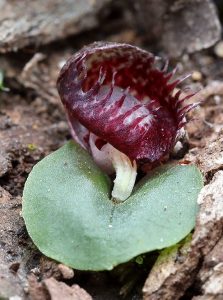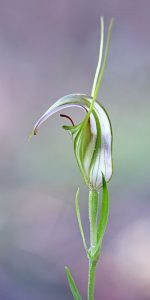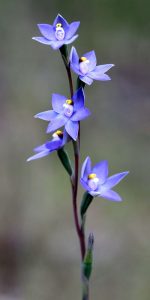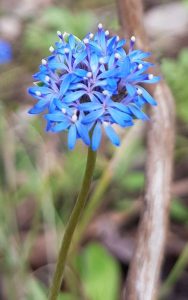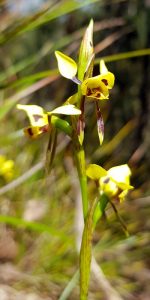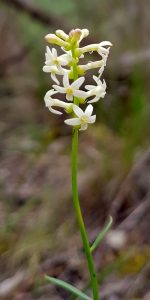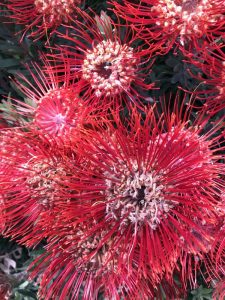Thanks to the people who have contributed to this week’s newsletter: Choon yin Yeok, George Pergaminelis, Pam Jenkins, Rhi Canaway, Richard Smith, Robin Gale-Baker, Therese Scales and Vasundhara Kandpal.
If you are Gmail user and didn’t successfully receive our newsletter last week, read this short guide on how to stop Google’s blocking of our future newsletters.
The more people who contribute material, the better this newsletter. If you have any interesting news, tips, photos or questions, email them to us.
Pruning of mature deciduous fruit trees (by Therese Scales)
[Therese is a horticulturalist at Nillumbik Nursery in Diamond Creek. About a month ago, she wrote an article about formative pruning of deciduous fruit trees. When the framework branches have been established (about 4 years), you can, as discussed below, start pruning for the production of healthy fruit. Note that Nillumbik Nursery write a monthly newsletter with gardening tips which you can sign up for here.]
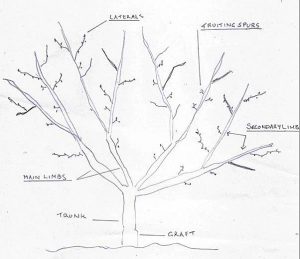 Remove anything that is …
Remove anything that is …
- Dead.
- Damaged.
- Diseased.
- Branches crossing through the centre of the tree.
- Branches rubbing against one another.
- Branches growing vertically.
General pruning tips
- Keep tools clean and sharp.
- Prune to an outward facing bud to avoid congested growth in the centre of the tree and to open up that canopy for good light penetration and airflow.
- Use loppers or a pruning saw on large branches.
- Put the sharp edge of the blade next to the bud (spur or sprig) – close, but not too close.
- Angle the cut away from the bud.
- Avoid pruning in wet conditions because it increases the risk of infection at the new wound.
Pruning by species of fruit tree
Fruit trees have either sprigs or spurs. Both carry the fruiting buds and form off lateral branches. Each lateral branch may have several spurs or sprigs. A spur is thicker and longer and the fruiting buds that form along it will typically be larger and further apart. Sprigs are thinner and clustered together and the fruiting buds along them tend to be smaller and closer together. Because sprigs are finer than spurs, keeping them shorter and close to the main limbs will help prevent them drooping and breaking.
- Apples and pears fruit on spurs. Prune to the 2nd bud and in the following year to the 1st bud. Remove spurs after 6 seasons.
- Apricots fruit on 2-3 year old sprigs. Remove old and weak sprigs to encourage new ones. Prune after harvest (late summer) to avoid gummosis.
- Cherries fruit on previous season’s spurs. Cut framework branches back by one third to produce fruiting buds for next year. Prune after fruiting to avoid cutting away fruiting spurs for next season.
- Peaches and nectarines fruit on previous season’s growth (and thus each sprig only fruits once). Remove all sprigs which have given fruit.
- Plums fruit on spurs. Prune for shape.
Pruning and care of deciduous fruit trees (by Robin Gale-Baker)
[Presented below is a shortened version of Robin’s new article about the pruning and care of fruit trees.]
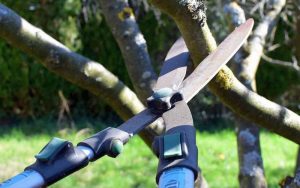 Robin’s first tip is to prune individual fruit trees at the right time of year. More specifically:
Robin’s first tip is to prune individual fruit trees at the right time of year. More specifically:
- Apples, pears and quince – in winter, when leafless. Prune on a dry day.
- Apricots and cherries – in late summer, after harvest.
- Peaches and nectarines – new growth lightly in summer and complete the prune in autumn.
- Plums – in late summer or autumn, after harvest.
Robin’s second tip is to prune on a warm, dry day (especially for apricots and cherries), preferably with a breeze as this allows the cuts to dry out quickly and prevents bacterial infection and canker.
Robin’s third tip is to remove suckers. Suckers grow out of the ground around the tree base or out from the lower trunk below the graft. There are two schools of thought on sucker removal. The first is to remove suckers when they appear (or anytime you notice them) as they weaken the tree. The second is to remove them in summer when the soil is dry, to prevent fungal infection taking hold on the pruning cuts. Cut suckers out with sharp secateurs at ground level.
Robin’s fourth tip is to avoid using wound heal sprays. Trees need to form wood callouses on pruning wounds. Avoid spraying with a wound heal product because it can prevents oxygen getting to the wound, resulting in poor callous development, and allowing disease to enter the tree.
Robin’s final tip is to avoid Bordeaux mix and use lime sulphur instead. Bordeaux mix (copper sulphate) is often used on fruit trees to prevent fungal diseases. However, it is now banned in 18 European countries because of its adverse effects on critters and soil microbiology. Lime sulphur is both an anti-fungal and a pesticide. Apply in winter while the trees are leafless prior to bud swell.
Bev’s soil fun fact of the week
[Bev Middleton lives in Macleod and is from Soil Week Australia.]
About 25% of healthy soil is air – and it ‘breathes’, constantly exchanging gases with the atmosphere. The rate of this breathing, or respiration, is in fact one indicator of the microbial activity in, and therefore the health of, the soil.
Do you know?
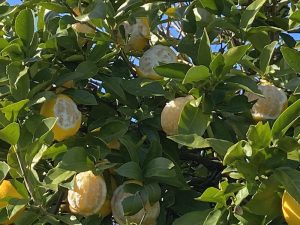 Jeremy Mather writes in: “What is eating the rind of the lemons on my tree (see photo)? Possums? Cockatoos? Can anybody suggest some deterrent or otherwise to protect my crop?” Email me with your responses.
Jeremy Mather writes in: “What is eating the rind of the lemons on my tree (see photo)? Possums? Cockatoos? Can anybody suggest some deterrent or otherwise to protect my crop?” Email me with your responses.
Do you want?
Richard Smith has a tangelo tree that he doesn’t want any more. “It’s a really good tree, around 1.8m tall, that I would like to give away at no charge. I have taken all the fruit off it, cut back the foliage and it is partly wrenched.” [Editor: I asked Richard what ‘wrenched’ means in this context and he replied that ‘wrenching’ is a process where the roots are cut without lifting the plant, then uplifted and bagged up. ‘Half wrenched’ means that only one half has been cut, with the other half to be cut later, so that it is not so much of a shock.] Pick up in Cheltenham. If you are potentially interested, email Richard.
Podcast of the week
Riverford Organic Farmers, from the UK, have produced a series of videos, called Veg hacks, discussing what to do recipe-wise with various vegetables. There are more than 100 in the series so there should be something of interest to everyone.
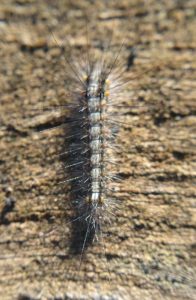 Not all caterpillars eat leaves (by Pam Jenkins)
Not all caterpillars eat leaves (by Pam Jenkins)
On a recent, fine sunny morning I (Pam) was surprised to see 30 or 40 small, furry caterpillars on the handrail of our north-facing deck. It seemed strange as they were a long way from any leafy greens. I decided that there wasn’t anything growing nearby that they could seriously damage so took a few photos and left them to do their thing. I submitted a photo to the MyPestGuide Reporter app and some days later received a response informing me that they are a native moth species, either Anestia ombrophanes (the clouded footman) or Anestia semiochrea (the marbled footman). They are apparently widespread over high rainfall areas but not commonly observed in Melbourne. They would have been feeding on the lichen and algae growing on my handrail. A helpful caterpillar!
The female adult is about 1cm long, wingless and flightless. She stays near her cocoon and the male copulates with her there. So how did she get from a high rainfall area to my handrail to lay her eggs? Aaah, the magic of nature!
Newsletter reader of the week – ???
No one has come forward to be this week’s newsletter reader of the week. Does no one have a website or project that they wish to tell the rest of us about? Send me an email and I will include you in a future newsletter. If no one comes forward this week, we will discontinue this section.
The photo competition
The results of last week’s competition
3 people submitted photos of native Melburnian plants. The winner is George Pergaminelis for the photo of a slender sun orchid and the runner up is Rhi Canaway for the photo of a blue pincushion. Here are some of their entries:
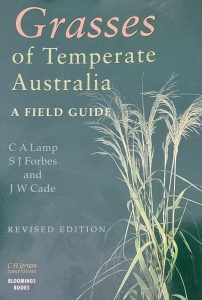 This week’s competition
This week’s competition
The theme of this week’s competition is grasses and the prize is Grasses of temperate Australia.
To enter the competition, email your photos of any grasses, including identification if possible, by end of play Monday, 25th July. Our judging panel will then cogitate on Tuesday and the various entries will be included in the newsletter on Wednesday.
Another new article by Angelo Eliades
Read more of Angelo’s food-growing articles.
Which link was clicked most times in the last newsletter?
The most popular link in the last newsletter was the ultimate list of 58 vegan cafes in Melbourne.
Regular activities over the coming week
Farmers’ markets
- Saturday: Abbotsford and Coburg.
- Sunday: Alphington, Carlton and Eltham.
Food swaps
- Saturday: Blackburn North, Brunswick East, Heathmont, Heidelberg, Hurstbridge and Preston/Thornbury.
- Sunday: Eltham.
Community gardens
- Thursday: Diamond Valley Library (Greensborough), Edible Hub (Hurstbridge), SEEDs (Brunswick) and Whittlesea.
- Friday: Reynard Street (Coburg) and West Brunswick.
- Saturday: Links (Lalor), Macleod and Thrive (Diamond Creek).
- Sunday: Creeds Farm (Epping), Fawkner Food Bowls, Pentridge (Coburg), Regent (Reservoir) and West Brunswick.
- Monday: SEEDs (Brunswick) and Whittlesea.
- Tuesday: Watsonia Library.
- Next Wednesday: Living & Learning Eltham, Macleod, Newton Street (Reservoir), Span (Thornbury) and Sylvester Hive (Preston).
Upcoming face-to-face events – not cooking
Gin tasting with Naught Distillery; Monday, 1st August, 7-9pm; $43 ($22 per hour); Montmorency.
In this evening of gin and cocktail tastings, a representative from Naught Gin, who are based in Eltham, will present their gin.
Composting and worm farms; Monday, 15th August, 4.30-6pm; free; Kew.
Teresa, from Sustainable Gardening Australia, will cover the why and how of composting and worm farms in this family friendly workshop. There will also be a wriggly paper worm craft activity for the kids. Organised by Kew Library.
Meet the wine makers – Golding Wines; Saturday, 20th August, 3-5pm; $63 ($32 per hour); Northcote.
Explore Golding Wines from the Adelaide Hills through 6 of their wines in a special event hosted by the winemaker. Learn about their vineyards, wines and how they survived the 2019 bushfires. The tickets include food.
Winter fruit tree maintenance; Saturday, 27th August, 9.30am-midday; $55 ($22 per hour); Bulleen Art and Garden Nursery.
What you will learn: pruning of both new and established fruit trees; selection and planting of new fruit trees; Winter fruit tree maintenance practices for pest and disease prevention, control and treatment; and pruning tool maintenance. Presented by Tess.
Meet the wine makers – Chalmers; Saturday, 27th August, 3-5pm; $63 ($32 per hour); Northcote.
Meet the famous Chalmers family as they take you through 6 of their wines. The tickets include food.
Heal with food – skin health; Sunday, 28th August, 11am-1pm; free; Eltham.
 Dermatologist Dr Niyati Sharma (MBBS, FACD, MPH) will discuss common skin conditions such as acne, eczema, psoriasis, hives, rosacea and share her knowledge about how to use food as medicine to manage these conditions. The talk will be followed by Q&A and then a free, healthy lunch. This is the first of a series of monthly talks by health professionals about using food as medicine. Future talks will cover such subjects as asthma, bone diseases, cancer, cardiovascular diseases, dementia, depression & anxiety, diabetes, obesity and reproductive health. Organised by Green Karma.
Dermatologist Dr Niyati Sharma (MBBS, FACD, MPH) will discuss common skin conditions such as acne, eczema, psoriasis, hives, rosacea and share her knowledge about how to use food as medicine to manage these conditions. The talk will be followed by Q&A and then a free, healthy lunch. This is the first of a series of monthly talks by health professionals about using food as medicine. Future talks will cover such subjects as asthma, bone diseases, cancer, cardiovascular diseases, dementia, depression & anxiety, diabetes, obesity and reproductive health. Organised by Green Karma.
Grazing board making workshop for women; Thursday, 1st September, 6-8pm; $189 ($95 per hour); Richmond.
Hayley Nicole will take you through the process of choosing from pre-prepared timber blanks, shaping and sanding then finishing and nourishing your unique board. You will also share a grazing board and optional beverage through the afternoon. All materials will be provided.
Veggie gardening for beginners; Thursday, 1st September, 6.30-9pm; $55 ($22 per hour); Bulleen Art and Garden Nursery.
What you will learn: how to set up and prepare a vegetable garden; how to select, plant and care for crops; and how to grow veggies in the ground, in raised beds and in pots. Presented by Tess. This class will teach you everything you need to know to grow delicious produce in your own backyard. They will cover all of the veggie gardening basics, from setting up your patch to harvesting.
Gardening in small spaces; Saturday, 10th September, 10am-3pm; $115 ($23 per hour); CERES.
You will learn how to maximise your small space to create an oasis of food, herbs and ornamentals. In particular, you will learn: gardening skills; how to maximise small spaces and grow your own food; and how to transform your balcony. Presenter: Clare.
SEEDs Soup Festival; Sunday, 11th September, 11am-5pm; free; Brunswick.
Join them in celebrating SEEDs Communal Garden at their annual ‘winter soup’ fundraiser – with workshops, garden grown meals, mini market, live music and dancing.
In July
- Complete urban farmer (14 sessions); weekly, starting Thursday, 21st July, 9am-3pm; $880 ($10 per hour); CERES.
- Set up your own worm farm; Thursday, 21st July, 11am-midday; free; Greensborough.
- Fruit tree pruning and care; Thursday, 21st July, 7-8pm; free; Mill Park.
- Inner North plus Gospel Whiskey; Thursday, 21st July, 7-10pm; $5; Brunswick.
- Movie themed cocktail making class; Friday, 22nd July, 7-8.30pm; $95 ($64 per hour); Brunswick.
- Beeswax wraps; Saturday, 23rd July, 10am-midday; $75 ($38 per hour); CERES.
- The fungus amongst us; Saturday, 23rd July, 10am-12.30pm; $55 ($22 per hour); Alphington.
- Ageing in rural Nillumbik – let’s talk land management; Saturday, 23rd July, 11.30am-1pm; free; St Andrews.
- Wine tasting and history tour; Saturday, 23rd July, 1-4pm; $50 ($17 per hour); Coburg.
- Growing food in pots and small spaces (15 sessions); Mondays starting 25th July, each 9.30am-12.30pm; free; Fawkner.
- International wine masterclass; Saturday, 30th July, 3-5pm; $63 ($32 per hour); Northcote.
- Beekeeping – how to get started; Sunday, 31st July, 9.30-10.45am; $20 (reimbursable at the nursery); Diamond Creek.
- Introduction to growing microgreens; Sunday, 31st July, 10am-midday; $60 ($30 per hour); Preston.
- Home brewing; Sunday, 31st July, 10am-3pm; $80 ($18 per hour); CERES.
- Cheese and wine tasting; Sunday, 31st July, 2-5pm; $55 ($18 per hour); Brunswick East.
In August
- Gin tasting with Naught Distillery; Monday, 1st August, 7-9pm; $43 ($22 per hour); Montmorency.
- Fruit tree pruning with Kaye Roberts-Palmer; Tuesday, 2nd August, 11am-12.30pm; free; Doncaster.
- Fruit tree pruning workshop; Saturday, 6th August, 10-11.30am; $44 ($29 per hour); Carlton North.
- Basic inoculation workshop; Saturday, 6th August, 10am-midday; $87 ($44 per hour); Alphington.
- Grafting and tree sales day; Saturday, 6th August, 10am-midday; free; CERES.
- Learn Winter fruit tree pruning; Saturday, 6th August, 10am-12.30pm; $25 ($10 per hour); Forest Hill.
- Wicking bed wow; Saturday, 6th August, 10am-1pm; $189 ($38 per hour); Ringwood.
- Crop rotation and companion planting; Saturday, 6th August, 11am-midday; free; Watsonia.
- Alternative varietals wine masterclass; Saturday, 6th August, 3-5pm; $63 ($32 per hour); Northcote.
- Introduction to meadmaking (three sessions); Saturdays 6th August, 3rd September and 24th September, all 10am-midday; $50; Eltham.
- Grafting and tree sales day; Sunday, 7th August, 9am-midday; free; Templestowe.
- Healthy productive compost and worms; Sunday, 7th August, 9.30am-12.30pm; $50 ($17 per hour); Bulleen Art and Garden Nursery.
- Herb planting workshop; Sunday, 7th August, 10-11.30am; $60 ($40 per hour); Park Orchards.
- In-depth mushroom cultivation workshop; Sunday, 7th August, 10am-4pm; $165 ($28 per hour); Alphington.
- Foundation to organic gardening course (3 sessions); on 3 consecutive Sundays from 7th August, 10am-1pm; $65 ($7 per hour); Richmond.
- Introduction to horticultural permaculture (4 sessions); on 4 consecutive Mondays from 8th August, 10am-2.30pm; $50 for all 4 sessions; Eltham.
- Care of backyard chickens; Thursday, 11th August, 11am-midday; free; Greensborough.
- Mushroom foraging; Thursday, 11th August, 7-9pm; $85 ($43 per hour); Collingwood.
- Growing fruit and veggies in small spaces; Sunday, 14th August, 9.30am-12.30pm; $50 ($17 per hour); Bulleen Art and Garden Nursery.
- Composting and worm farms; Monday, 15th August, 4.30-6pm; free; Kew.
- DIY mushrooms; Saturday, 20th August, 10am-4pm; $165 ($28 per hour); CERES.
- Bees in your backyard; Saturday, 20th August, 10-11am; free; Balwyn.
- Meet the wine makers – Golding Wines; Saturday, 20th August, 3-5pm; $63 ($32 per hour); Northcote.
- Compost and worm farms; Sunday, 21st August, 9.30-10.15am; $15 (reimbursable at the nursery); Diamond Creek.
- Growing mushrooms at home; Sunday, 21st August, 10am-12.30pm; $95 ($38 per hour); Alphington.
- Preparing for a summer veggie crop; Saturday, 27th August, 9-10.30am; free; Camberwell.
- Winter fruit tree maintenance; Saturday, 27th August, 9.30am-midday; $55 ($22 per hour); Bulleen Art and Garden Nursery.
- Australian plants expo; Saturday, 27th August, 10am-4pm; $5; Eltham.
- Preparing for a summer veggie crop; Saturday, 27th August, 11.30am-1pm; free; Camberwell.
- Meet the wine makers – Chalmers; Saturday, 27th August, 3-5pm; $63 ($32 per hour); Northcote.
- Australian plants expo; Sunday, 28th August, 10am-4pm; $5; Eltham.
- Heal with food – skin health; Sunday, 28th August, 11am-1pm; free; Eltham.
In September
- Grazing board making workshop for women; Thursday, 1st September, 6-8pm; $189 ($95 per hour); Richmond.
- Veggie gardening for beginners; Thursday, 1st September, 6.30-9pm; $55 ($22 per hour); Bulleen Art and Garden Nursery.
- Complete urban farmer (14 sessions); weekly, starting Friday, 2nd September, 9am-3pm; $880 ($10 per hour); CERES.
- Edible weeds walk; Saturday, 3rd September, 10.30am-12.30pm; $25 ($13 per hour); Brunswick East.
- Edible weeds walk; Saturday, 3rd September, 1.30-3.30pm; $25 ($13 per hour); Brunswick East.
- Complete urban farmer (14 sessions); weekly, starting Wednesday, 7th September, 9am-3pm; $880 ($10 per hour); CERES.
Regular events
- Bakery Hill whisky distillery tour and tasting; various Sundays, various times; $64 ($43 per hour); Bayswater North.
- Beekeeping workshop; roughly once a month; $85 ($34 per hour); Brunswick East.
- Carlton aperitvio food tour; various Fridays, 5-7pm; $89 ($45 per hour); Carlton.
- Cocktail workshop; Saturdays, at 2pm and again at 5pm; $55 ($37 per hour); Northcote.
- Flavours of Coburg food tour; various Saturdays, 10am-1pm; $49 ($16 per hour); Coburg.
- Gin making masterclass; most Saturdays, 10am-1pm; $175 ($58 per hour); Nunawading.
- Ratio Cocoa Roasters behind the scenes chocolate factory tour; various Fridays and Saturdays; $15 ($10 per hour); Brunswick.
Upcoming face-to-face events – cooking
Kombucha brewing workshop; Thursday, 28th July, 7-11pm; $54 ($14 per hour); Brunswick.
Learn how to brew your own kombucha. Plus, receive your own kombucha SCOBY starter kit to create your own brew. Organised by the Good Brew Company.
Pasta making; Thursday, 18th August, 7-9pm; free; Thomastown.
Learn how to make pasta. Organised by Thomastown Library.
Sourdough bread; Saturday, 10th September, 10am-12.30pm; $75 ($30 per hour); Park Orchards.
Nadine will demonstrate the technique of sourdough bread making and baking. Take a container to take home your dough to bake at home. This class is best suited to those who have some experience with bread making, however it is not essential. Organised by Park Orchards Community House.
Growing, cooking, sharing – a harmony of tastes cooking class; Saturday, 10th September, 10am-1pm; $15; Forest Hill.
In this cooking class, they will bring to life recipes taken from the community cookbook A Harmony of Tastes compiled by Whitehorse Manningham Libraries. Learn how to prepare and share Greek zucchini bake, Guatemalan atol de elote and Iranian anarbij (anar bij). Go along, learn some new skills and share a meal with your community.
Cultural cooking – Indian curries; Saturday, 10th September, 11am-1pm; $50 ($25 per hour); Alphington.
Manu will show you how to make Indian curries. Organised by Alphington Community Centre.
In July
- Truffle and praline workshop; Wednesday, 20th July, 6-10pm; $180 ($45 per hour); Blackburn
- Sourdough bread baking; Saturday, 23rd July, 9am-5pm; $180 ($23 per hour); CERES.
- Make a sourdough loaf; Saturday, 23rd July, 10am-1pm; $46 ($15 per hour); Hurstbridge.
- An artisan chocolate baking class; Sunday, 24th July, 10am-1pm; $175 ($58 per hour); Alphington.
- Feta and haloumi cheese making; Sunday, 24th July, 10am-4pm; $170 ($28 per hour); CERES.
- Kombucha brewing workshop; Thursday, 28th July, 7-11pm; $54 ($14 per hour); Brunswick.
- Cup cake bouquet workshop; Friday, 29th July, 6.30-8.30pm; $70 ($35 per hour); Park Orchards.
In August
- Pickling and fermentation workshop; Thursday, 4th August, 7-9pm; free; Watsonia.
- Christmas cookie decorating workshop; Friday, 5th August, 6.30-8.30pm; $65 ($33 per hour); Park Orchards.
- Mozzarella making class; Saturday, 6th August, 10am-midday; $120 ($60 per hour); Thomastown.
- Sourdough bread making; Saturday, 6th August, 10am-12.30pm; $64 ($26 per hour); Lower Templestowe.
- Introduction to fermenting at home; Saturday, 6th August, 10am-1pm; $70 ($23 per hour); CERES.
- Cultural cooking – Indian breads; Saturday, 6th August, 11am-1pm; $50 ($25 per hour); Alphington.
- Chinese home cooking; Saturday, 6th August, 11am-1pm; $30 ($15 per hour); Brunswick.
- Cake decorating using coloured fondants; Sunday, 7th August, 1-4pm; $79 ($26 per hour); Surrey Hills.
- One pot wonders of the world – slow cooking in a master stock; Friday, 12th August, 5-9pm; $85 ($21 per hour); Panton Hill.
- Dumpling making workshop; Friday, 12th August, 6-9pm; $75 ($25 per hour); Park Orchards.
- Pasta making workshop; Monday, 15th August, 10-11am; $30 ($30 per hour); Park Orchards.
- Italian kids cooking class; Thursday, 18th August, 4.30-6.30pm; $35 ($18 per hour); Surrey Hills.
- Demystifying bread; Thursday, 18th August, 6.30-9pm; $60 ($24 per hour); Park Orchards.
- Pasta making; Thursday, 18th August, 7-9pm; free; Thomastown.
- Gingerbread house workshop; Friday, 19th August, 6.30-8.30pm; $70 ($35 per hour); Park Orchards.
- An artisan chocolate dessert class; Sunday, 21st August, 10am-1pm; $154 ($51 per hour); Alphington.
- Cheddar cheese making; Sunday, 21st August, 10am-5pm; $170 ($24 per hour); CERES.
- Sri Lankan cooking class; Wednesday, 24th August, 6-9pm; $90 ($30 per hour); Surrey Hills.
- Cooking with Jean; Thursday, 25th August, 7-8.30pm; free; Mill Park.
- Make low waste comfort food; Saturday, 27th August, 10am-12.30pm; $30 ($12 per hour); Forest Hill.
- Gnocchi making class; Saturday, 27th August, 10am-1pm; $125 ($42 per hour); Thomastown.
- Veggies in desserts; Sunday, 28th August, 10am-3pm; $115 ($23 per hour); CERES.
- Indian cooking – Punjabi (two sessions); Wednesday, 31st August and Wednesday, 7th September, both 6.30-8.30pm; $110 ($55 per hour); Hurstbridge.
In September
- Italian cooking (2 sessions); Thursday, 1st September and Thursday, 8th September, both 6-9pm; $190 ($32 per hour); Surrey Hills.
Regular classes
- @drool.aus (Italian); various Saturdays and Sundays; roughly $100 ($40 per hour); Fitzroy and Northcote.
- Al dente cooking (Italian); most Saturdays, 9am-1pm; $155 ($39 per hour); Chirnside Park.
- Become a junior chocolatier; various days and times; $40 ($53 per hour); Yarra Glen.
- Beginners bread making; various Sundays, 8am-2pm; $220 ($37 per hour); Abbotsford.
- Chocolate discovery class; various days and times; $48 ($48 per hour); Yarra Glen.
- Chocolate making workshop; various Thursdays, Fridays and Saturdays; $152 ($38 per hour); Blackburn.
- La Cucina di Sandra (Italian); various evenings, 6.30-10.30pm; $105 ($26 per hour); Richmond.
- Nonna & Mum’s cooking class; monthly on the 4th Thursday, 6-10pm; $20 ($7 per hour); Thornbury.
- Otao Kitchen (various classes); various dates, times and prices; Richmond.
- Rosa’s traditional Italian cooking class; various Saturdays and Sundays; $155 ($39 per hour); Bundoora.
- The ultimate biscuit class; various Tuesdays, 10am-3pm; $162 ($32 per hour); Blackburn.


